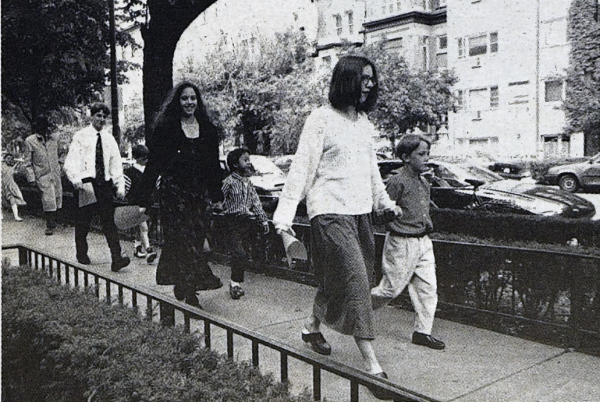How Is Latin Managing Its Budget This Year?
GG+A SurveyLab
Faced with higher expenses and a predicted 25% decrease in donations, Latin, like many COVID-19 era nonprofit organizations, is planning for an operating deficit this year.
The economic recession caused by COVID-19 will likely affect some Latin families’ ability to pay tuition. The school preemptively increased its potential financial assistance budget by 40%, but Michael Szczepanek, Latin’s Chief Financial Officer, said that as of now, “We have not seen a huge demand, an increase that would gobble up that value.”
However, based on what Latin saw in the aftermath of the 2008 recession, the school remains prepared for that need to increase.
Director of Development Anne Hobbs said, “We really do expect that there will be a great deal more need for financial support that will remain for much longer than when on paper the economic crisis will look like it’s resolved.”
Latin increased its budget for Diversity, Equity, and Inclusion as well. This budget was increased earlier last year, when Latin hired Brandon Woods to do an Upper School curriculum review with an eye toward inclusivity. Ms. Hobbs said Latin is “actively working with the donor community to help increase the DEI budget beyond that.”
From purchasing PPE equipment to hiring new staff and facilities crew, preparing Latin for a safe return to school was expensive. Last year, the school ended up with a surplus of cash, which went directly to help pay for this year’s added costs. “We spent hundreds of thousands of dollars to try to prepare the school to bring kids and faculty and staff back to be safe,” said Mr. Szczepanek.
Latin has made budget cuts in other areas in an attempt to offset some of this increased spending. While personnel expenses remained the same, Ms. Hobbs said, “Everywhere else that we could cut, we cut, so most budgets were cut by somewhere between 15 and 20 percent, across the school.”
And with Upper Schoolers learning from home, Latin saw some natural cost reductions. Mr. Szczepanek said, “You can’t do a retreat like you’d normally do, or assemblies like you’d normally do, or guest speakers like you’d normally do.” These cuts extend beyond the school day. “When you’re in person it’s always going to be more expensive,” he said, “so naturally there are going to be some ways in which we are going to identify some of those savings.”
Socially distanced fundraisers may be less expensive, but they are also less effective. “A lot of the volunteer structures have shifted,” Ms. Hobbs said, “but significantly a lot of the events like Scholarship Dinner and Romans Raise and Revel, which have provided about a third of our annual giving support, have to be completely redesigned because of gathering restriction.”
Mr. Szczepanek added that “having a fundraising event through Zoom does not have quite the same gravity.”
Events aside, are families willing and able to donate to Latin right now?
“Election years are traditionally kind of hard,” Ms. Hobbs said. “There’s a lot of competition for dollars as people are becoming engaged in the campaigns, and this year is a very divisive, high-stakes time. Then you add into it the pandemic, disruptions to family and friends’ lives based on health and well-being, market uncertainty and financial setbacks, and in Latin’s case both disruption to the content and delivery of education, not to mention the national conversation on race and social justice that’s obviously very personally played a front and center role at Latin.”
These factors indeed impact giving. Recently, Ms. Hobbs talked to someone who shared that they’re going to have to adjust their giving to economically support extended family members. Even those who are not supporting additional family are feeling spread thin. Tracey Benford, a Latin parent who has given to the school for many years, said, “There are lots of other places that people feel it’s important to give their money to, so separate from how people feel about Latin, people are spreading what they are giving to around.”
Not everyone agrees with how Latin has handled the pandemic, and that may further impact donations. Ms. Hobbs said, “I’ve talked to other folks who have said I want to see what happens with the delivery of school before I make a decision about how much I want to contribute.”
Ms. Benford recognized that possibility as well, noting, “Certainly some people are going to speak with their dollars.”
However people feel, donations remain as important as ever. “Philanthropy generally supports about one out of every seven days at Latin,” said Ms. Hobbs.
Mr. Szczepanek said that during the last recession, “We had some very generous donations to make sure that we really took care of the Latin families who needed that assistance.”
In terms of her own family’s giving, Ms. Benford said, “We’re probably not changing anything we’re doing, because I think a lot of this money goes to the things that we’re really fighting for, which are scholarships and diversity. It’s hard to be so upset with the school like I don’t believe in those things anymore, because I do.”
In light of these circumstances, the school has delayed its asking this year, and is planning for a 25% decrease in donations. Latin’s endowment payout, on the other hand, remains roughly the same as last year, as the school’s investments have held up fine thus far in the recession.
“In March, along with everything else that was going on, you saw the endowment go way down,” said Ms. Hobbs. “But now we’re back up, we’ve recovered,” which means that the 4.5% payout of endowment funds to the school’s operating budget will be approximately the same amount of money that it has been in recent years.
When asked if Latin would consider using more of these funds to offset other losses, Mr. Szczepanek said, “We’re not pulling the extra assets from the endowment, absolutely not.”
Between the increased costs and decreased philanthropy, Latin plans to run at a deficit for the current fiscal year. “Our board is allowing us to spend more this year than we are going to take in,” said Mr. Szczepanek. “And that’s okay.” He said that after staying within the budget for so many years, “We do have excess cash, we keep it like any good business would, for a rainy day, and it is kind of raining.”
In the midst of these changes, Latin strives to address concerns about accountability. “We have to provide greater transparency about the decision-making in the budgeting process, and provide more opportunities for that kind of partnership to support those areas of program that individuals are passionate about and that the school has set as its direction and priorities,” said Ms. Hobbs. “We want to meet every single financial aid obligation; we want to meet and exceed the funding needs to support the DEI growth that needs to take place.”

Bea Parr (‘21) is a senior at Latin and is very excited about serving her second year as one of The Forum’s Editors-in-Chief. In her articles, she...




















































